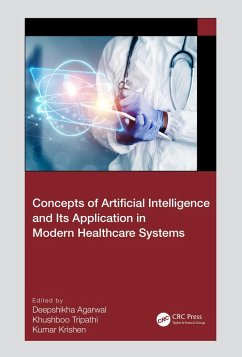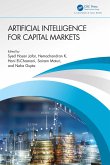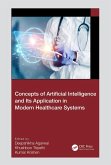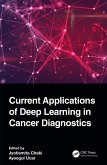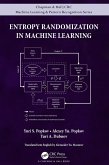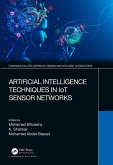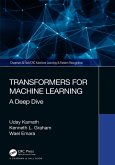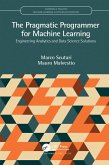Concepts of Artificial Intelligence and its Application in Modern Healthcare Systems (eBook, ePUB)
Redaktion: Agarwal, Deepshikha; Krishen, Kumar; Tripathi, Khushboo
45,95 €
45,95 €
inkl. MwSt.
Sofort per Download lieferbar

23 °P sammeln
45,95 €
Als Download kaufen

45,95 €
inkl. MwSt.
Sofort per Download lieferbar

23 °P sammeln
Jetzt verschenken
Alle Infos zum eBook verschenken
45,95 €
inkl. MwSt.
Sofort per Download lieferbar
Alle Infos zum eBook verschenken

23 °P sammeln
Concepts of Artificial Intelligence and its Application in Modern Healthcare Systems (eBook, ePUB)
Redaktion: Agarwal, Deepshikha; Krishen, Kumar; Tripathi, Khushboo
- Format: ePub
- Merkliste
- Auf die Merkliste
- Bewerten Bewerten
- Teilen
- Produkt teilen
- Produkterinnerung
- Produkterinnerung

Bitte loggen Sie sich zunächst in Ihr Kundenkonto ein oder registrieren Sie sich bei
bücher.de, um das eBook-Abo tolino select nutzen zu können.
Hier können Sie sich einloggen
Hier können Sie sich einloggen
Sie sind bereits eingeloggt. Klicken Sie auf 2. tolino select Abo, um fortzufahren.

Bitte loggen Sie sich zunächst in Ihr Kundenkonto ein oder registrieren Sie sich bei bücher.de, um das eBook-Abo tolino select nutzen zu können.
This reference text presents the usage of artificial intelligence in healthcare and discusses the challenges and solutions of using advance techniques like wearable technologies, image processing in the sector. It focuses on the use of artificial intelligence (AI) in healthcare with issues, applications, and prospects.
- Geräte: eReader
- mit Kopierschutz
- eBook Hilfe
Andere Kunden interessierten sich auch für
![Artificial Intelligence for Capital Markets (eBook, ePUB) Artificial Intelligence for Capital Markets (eBook, ePUB)]() Artificial Intelligence for Capital Markets (eBook, ePUB)45,95 €
Artificial Intelligence for Capital Markets (eBook, ePUB)45,95 €![Concepts of Artificial Intelligence and its Application in Modern Healthcare Systems (eBook, PDF) Concepts of Artificial Intelligence and its Application in Modern Healthcare Systems (eBook, PDF)]() Concepts of Artificial Intelligence and its Application in Modern Healthcare Systems (eBook, PDF)45,95 €
Concepts of Artificial Intelligence and its Application in Modern Healthcare Systems (eBook, PDF)45,95 €![Current Applications of Deep Learning in Cancer Diagnostics (eBook, ePUB) Current Applications of Deep Learning in Cancer Diagnostics (eBook, ePUB)]() Current Applications of Deep Learning in Cancer Diagnostics (eBook, ePUB)46,95 €
Current Applications of Deep Learning in Cancer Diagnostics (eBook, ePUB)46,95 €![Entropy Randomization in Machine Learning (eBook, ePUB) Entropy Randomization in Machine Learning (eBook, ePUB)]() Yuri S. PopkovEntropy Randomization in Machine Learning (eBook, ePUB)45,95 €
Yuri S. PopkovEntropy Randomization in Machine Learning (eBook, ePUB)45,95 €![Artificial Intelligence Techniques in IoT Sensor Networks (eBook, ePUB) Artificial Intelligence Techniques in IoT Sensor Networks (eBook, ePUB)]() Artificial Intelligence Techniques in IoT Sensor Networks (eBook, ePUB)45,95 €
Artificial Intelligence Techniques in IoT Sensor Networks (eBook, ePUB)45,95 €![Transformers for Machine Learning (eBook, ePUB) Transformers for Machine Learning (eBook, ePUB)]() Uday KamathTransformers for Machine Learning (eBook, ePUB)46,95 €
Uday KamathTransformers for Machine Learning (eBook, ePUB)46,95 €![The Pragmatic Programmer for Machine Learning (eBook, ePUB) The Pragmatic Programmer for Machine Learning (eBook, ePUB)]() Marco ScutariThe Pragmatic Programmer for Machine Learning (eBook, ePUB)46,95 €
Marco ScutariThe Pragmatic Programmer for Machine Learning (eBook, ePUB)46,95 €-
-
-
This reference text presents the usage of artificial intelligence in healthcare and discusses the challenges and solutions of using advance techniques like wearable technologies, image processing in the sector. It focuses on the use of artificial intelligence (AI) in healthcare with issues, applications, and prospects.
Hinweis: Dieser Artikel kann nur an eine deutsche Lieferadresse ausgeliefert werden.
Dieser Download kann aus rechtlichen Gründen nur mit Rechnungsadresse in A, B, BG, CY, CZ, D, DK, EW, E, FIN, F, GR, HR, H, IRL, I, LT, L, LR, M, NL, PL, P, R, S, SLO, SK ausgeliefert werden.
Hinweis: Dieser Artikel kann nur an eine deutsche Lieferadresse ausgeliefert werden.
Produktdetails
- Produktdetails
- Verlag: Taylor & Francis eBooks
- Seitenzahl: 324
- Erscheinungstermin: 31. Juli 2023
- Englisch
- ISBN-13: 9781000906004
- Artikelnr.: 68274838
- Verlag: Taylor & Francis eBooks
- Seitenzahl: 324
- Erscheinungstermin: 31. Juli 2023
- Englisch
- ISBN-13: 9781000906004
- Artikelnr.: 68274838
- Herstellerkennzeichnung Die Herstellerinformationen sind derzeit nicht verfügbar.
Dr. Deepshikha Agarwal is currently working as the Head of Department and Assistant Professor at Indian Institute of Information Technology, Lucknow. She has teaching and research experience of more than 17 years. She published more than 40 research papers and guided projects in the fields of Mobile and Adhoc communications, optimization algorithms, wireless sensor networks, IOT & Machine Learning and Blockchain. Achieved Ph.D degree from MNNIT Allahabad in 2015 and M.Tech degree from IIIT Allahabad in 2004 with research work on Wireless sensor networks. She is also guiding projects and Ph.D candidates. She has achieved Membership of various professional bodies like IEEE, IET, PcPro, Oxford Journals. Active reviewer for reputed conferences and journals like IEEE Sensors, IEEE Access, Science Direct, Elsevier. Invited Speaker for International Conferences held in China and Japan. Editor of CRC published book and Chairman of sessions in international conferences. Registered as an accomplished international author in the Scholar's book of world records. Published several book chapters and books in international publishing houses like John Wiley and CRC .Received University Grant from Amity University for presenting research paper in IEEE Conference at Indonesia. She has recently been granted two innovation patents by Australian Government. She is also receipient of several prestigious awards like- SWAMI VIVEKANAND CHANGEMAKER AWARD & RISE & SHINE Women Eduvisionary Award by MentorX and International Academic Achievers Award (Excellent in Professional Achievement), JYD Int School of Higher education, Zurich, Switzerland in 2021. Dr. Khushboo Tripathi received a Ph. D. degree in computer science from University of Allahabad, Prayagraj, India in 2012. She received Master of Science in Computer Science & Engineering from KNIT Sultanpur, M. Sc. (Mathematics) and B.Sc. from University of Allahabad, Prayagraj. She has more than fifteen years of experience in teaching and research. Dr. Tripathi interests include research and implementation aspects of Wireless Ad Hoc Networks, MANET and SENSOR networks, secure routing protocols, SDN, Advanced Networking, Security, Data Interpretation. Dr. Tripathi has authored more than 30 papers and published in peer reviewed International Journals and conferences proceedings. Dr. Tripathi has authored various book chapters in scopus and Sci journals. She has supervised many Ph.D., M. Tech., MCA and B. Tech students in their thesis and projects. She has served as session chair and organiser for IEEE, Springer conferences. Currently she is currently serving as Assistant Professor in Department of Computer Science & Engineering at Amity University Haryana Gurgaon. Dr. Tripathi has been a reviewer for several international journals. She has earned many awards in her credits as a young researcher award by InSc Bengaluru, India, Swami Vivekanand change maker award by MENTORx Globally, best paper presentation awards at AUH. Dr. Tripathi is a member of ACM, IEEE, IET U.K. and Computer societies. Dr. Kumar Krishen is the ST Senior Scientist / Lead Technologist for the Advanced Planning Office, NASA Johnson Space Center (JSC), Houston, Texas, responsible for developing strategies for joint research and technology projects and plans with industries, universities, other NASA centers, and government agencies. He has served at Virginia Tech as University Fellow for Technology Transfer, Office of Special Initiatives, Visiting Professor on a special NASA assignment and Adjunct Professor at Rice University. His academic degrees are from Kansas State University (Ph.D. and M.S.-Phi Kappa Phi, Eta Kappa Nu & Sigma Xi honors), Calcutta University (M. Tech and B. Tech- Gold & Silver Medals), and Jammu and Kashmir University (B.A.- Highest Univ. Merit) in electronics, electrical engineering, radio physics, physics, and mathematics. Dr. Krishen taught and guided research at Kansas State University before joining Lockheed in 1969 as Staff Scientist. Dr. Krishen joined NASA in 1976 and has held key positions in Advanced Programs in Earth Observations, Science Payloads, Experiment Systems, Tracking & Communications, Mission Support, New Initiatives, and technology research and development. Authoring more than 160 technical papers/reports/proceedings, Dr. Krishen is a Fellow of the Society for Design and Process Science (SDPS) and an Assoc. Fellow of American Institute of Aeronautics and Astronautics (AIAA). He is the recipient of many awards, medals, and commendations from universities, industry, and government organizations, and is listed in Who is Who in the World, Who is Who in America, Who is Who in Science and Technology, Men of Achievement, Personalities of America, and 2000 Outstanding People of the 20th Century and was commissioned "Honorary Texan" by Texas Governor Rick Perry in 2001. Dr. Krishen was nominated by Governor George W. Bush and confirmed by the State Senate of Texas to the Texas Board of Licensure for Professional Medical Physicists in 1999 and continues to serve on this Board under Governor Perry's administration. Dr. Krishen was awarded Bharat Samman, the highest honor given by the Non Resident Indian (NRI) Institute in 2006. The award was presented by the British High Commissioner to India. He was awarded Hind Rattan, the highest award given by NRIW Society in 2008. The award was presented by Hon. Sushil Kumar Shinde, Union Minister for Power, Government of India.
1. Artificial Intelligence (AI) in Healthcare: Issues, Applications and
Future. 2 Artificial Intelligence in Medical Imaging for Developing
Countries: Challenges and Opportunities. 3. Artificial Intelligence in
Medical Imaging. 4. Medical Image Fusion: Transforms Techniques Based
Comparative Analysis for Brain Disease. 5. Artificial intelligence and
medical visualization. 6. Machine Learning Models for Early Diagnosis of
Depressive Mental Affliction. 7. Non-Invasive Technique of Breast Cancer
Diagnosis Using Interpretation of Fractal Dimension of Cells Nuclei in
Buccal Epithelium. 8. Fractionalization of Early Lung Tumour Regions and
Detection Using a Low Intricacy Approach. 9. Reshaping the Pathology: An AI
Perspective. 10. Influence of community mobility habits on the COVID-19
pandemic: A case study on India. 11. Impact of Social Media Platforms on
Vaccination Drive during COVID-19 Pandemic in India. 12. Pneumonia
Detection using Chest X-Ray with the help of Deep Learning. 13. AI
Technique from Type CN2 Rule Induction for Industry 4.0 with Healthcare
Problem. 14. Artificial Intelligence Issues in Healthcare. 15. Wearable
Technologies in AI and Smart HealthCare. 16. A Heterogeneous Medical
Imaging Social Security Analysis in Wireless Sensor Network. 17. Wearable
Technology: Concepts, Classification and Applications. 18. Analysis Of
Cardiac Dynamics And Assessment Of Arrhythmia By Classifying Heartbeat
Using Electrocardiogram
Future. 2 Artificial Intelligence in Medical Imaging for Developing
Countries: Challenges and Opportunities. 3. Artificial Intelligence in
Medical Imaging. 4. Medical Image Fusion: Transforms Techniques Based
Comparative Analysis for Brain Disease. 5. Artificial intelligence and
medical visualization. 6. Machine Learning Models for Early Diagnosis of
Depressive Mental Affliction. 7. Non-Invasive Technique of Breast Cancer
Diagnosis Using Interpretation of Fractal Dimension of Cells Nuclei in
Buccal Epithelium. 8. Fractionalization of Early Lung Tumour Regions and
Detection Using a Low Intricacy Approach. 9. Reshaping the Pathology: An AI
Perspective. 10. Influence of community mobility habits on the COVID-19
pandemic: A case study on India. 11. Impact of Social Media Platforms on
Vaccination Drive during COVID-19 Pandemic in India. 12. Pneumonia
Detection using Chest X-Ray with the help of Deep Learning. 13. AI
Technique from Type CN2 Rule Induction for Industry 4.0 with Healthcare
Problem. 14. Artificial Intelligence Issues in Healthcare. 15. Wearable
Technologies in AI and Smart HealthCare. 16. A Heterogeneous Medical
Imaging Social Security Analysis in Wireless Sensor Network. 17. Wearable
Technology: Concepts, Classification and Applications. 18. Analysis Of
Cardiac Dynamics And Assessment Of Arrhythmia By Classifying Heartbeat
Using Electrocardiogram
1. Artificial Intelligence (AI) in Healthcare: Issues, Applications and
Future. 2 Artificial Intelligence in Medical Imaging for Developing
Countries: Challenges and Opportunities. 3. Artificial Intelligence in
Medical Imaging. 4. Medical Image Fusion: Transforms Techniques Based
Comparative Analysis for Brain Disease. 5. Artificial intelligence and
medical visualization. 6. Machine Learning Models for Early Diagnosis of
Depressive Mental Affliction. 7. Non-Invasive Technique of Breast Cancer
Diagnosis Using Interpretation of Fractal Dimension of Cells Nuclei in
Buccal Epithelium. 8. Fractionalization of Early Lung Tumour Regions and
Detection Using a Low Intricacy Approach. 9. Reshaping the Pathology: An AI
Perspective. 10. Influence of community mobility habits on the COVID-19
pandemic: A case study on India. 11. Impact of Social Media Platforms on
Vaccination Drive during COVID-19 Pandemic in India. 12. Pneumonia
Detection using Chest X-Ray with the help of Deep Learning. 13. AI
Technique from Type CN2 Rule Induction for Industry 4.0 with Healthcare
Problem. 14. Artificial Intelligence Issues in Healthcare. 15. Wearable
Technologies in AI and Smart HealthCare. 16. A Heterogeneous Medical
Imaging Social Security Analysis in Wireless Sensor Network. 17. Wearable
Technology: Concepts, Classification and Applications. 18. Analysis Of
Cardiac Dynamics And Assessment Of Arrhythmia By Classifying Heartbeat
Using Electrocardiogram
Future. 2 Artificial Intelligence in Medical Imaging for Developing
Countries: Challenges and Opportunities. 3. Artificial Intelligence in
Medical Imaging. 4. Medical Image Fusion: Transforms Techniques Based
Comparative Analysis for Brain Disease. 5. Artificial intelligence and
medical visualization. 6. Machine Learning Models for Early Diagnosis of
Depressive Mental Affliction. 7. Non-Invasive Technique of Breast Cancer
Diagnosis Using Interpretation of Fractal Dimension of Cells Nuclei in
Buccal Epithelium. 8. Fractionalization of Early Lung Tumour Regions and
Detection Using a Low Intricacy Approach. 9. Reshaping the Pathology: An AI
Perspective. 10. Influence of community mobility habits on the COVID-19
pandemic: A case study on India. 11. Impact of Social Media Platforms on
Vaccination Drive during COVID-19 Pandemic in India. 12. Pneumonia
Detection using Chest X-Ray with the help of Deep Learning. 13. AI
Technique from Type CN2 Rule Induction for Industry 4.0 with Healthcare
Problem. 14. Artificial Intelligence Issues in Healthcare. 15. Wearable
Technologies in AI and Smart HealthCare. 16. A Heterogeneous Medical
Imaging Social Security Analysis in Wireless Sensor Network. 17. Wearable
Technology: Concepts, Classification and Applications. 18. Analysis Of
Cardiac Dynamics And Assessment Of Arrhythmia By Classifying Heartbeat
Using Electrocardiogram
